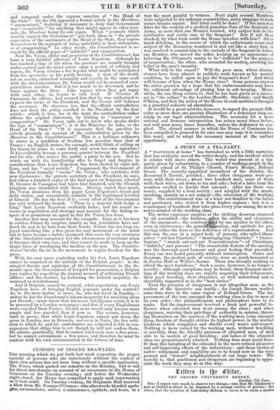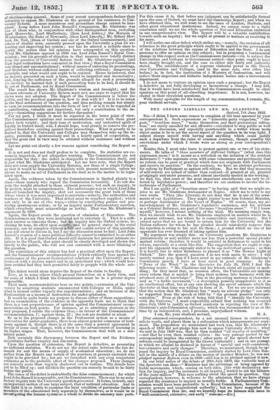frttrr5 tu tYr hitor.
THE OXFORD UNIVERSITY REPORT.
London, 7th June.
Sra—I regret very much to observe two things,—one, that Mr. Gladstone's seat at Oxford is about to be disputed by a strange medley of parties ; the other, that the question of University Reform is about to be made a matter of electioneering quarrel. Some of your recent correspondents declare their intention to oppose Mr. Gladstone on the ground of his resistance to Uni- versity Reform. A more monstrous and groundless charge cannot be ima- gined. Long before Lord John Russell's Commission, Mr. Gladstone was one of those who, in conjunction with other distinguished men, including Lord Harrow by. Lord Shaftesbury, (then Lord Ashley,) the Marquis of Westminster, the 'Duke of Newcastle, (then Lord Lincoln,) Mr. Sidney Her- bert, Dr. Tait, (Dean of Carlisle and one of the Oxford Commissioners,) and others of similar note, earnestly pressed upon the University a Plan for ex- tending and improving her system ; nor has he uttered a syllable since to justify the notion that his opinions have retrograded on this question. -What Mr. Gladstone opposed in 1850 was Lord John Russell's Royal Coin- mission; but his grounds of objection to that measure were totally distinct from the question of University Reform itself. Mr. Gladstone argued, (and high legal authorities have concurred in that view,) that a Royal CommissIon was illegal and unconstitutional ; without means of enforcing its proceedings, and therefore without sufficient means of collecting evidence ; dangerous in principle, and what would and ought to be resisted. Hence he inferred, that an inquiry grounded on such a basis, would be imperfect and inconclusive; and, denying the sufficiency of the grounds alleged for such a proceeding, (in invites) he insisted that if such proceeding were to be had, it should be by act of Parliament, not by Royal Commission. The result has shown Mr. Gladstone's wisdom and foresight; and the keenest advocate of University Reform must now see cause to regret that his views were not adopted. The Report of the Commissioners is before the public, and the practical question is, how to deal with it ? Is it to be taken as the final settlement of the question, and does nothing remain but simply to turn its recommendations into the form of law ? or is it to be regarded as a contribution, valuable and important, but only a contribution to the in- quiry—furnishing suggestions for further discussion ? For my part, I think it must be regarded in the latter point of view. The Commissioners' opinions and recommendations carry with them great prima facie weight ; and their tone of moderation, and undoubted spirit of loyalty to Oxford itself, will, I should hope, tend greatly to remove the pre- judices heretofore existing against their proceedings. What is greatly to be desired is, that the University and Colleges may themselves take up the in- quiry, pursuing it spontaneously and in a hearty spirit of cooperation, so that the great end in view may be attained without resistance and without violence.
Let me point out shortly a few reasons against considering the Report as final.
It is not and does not itself profess to be complete. Its statistics are ex- tremely imperfect, if not altogether wanting. The Commissioners are not responsible for that : the defect is chargeable to the Commission itself, and is just what Mr. Gladstone anticipated. Let me here note, that the Report does not even supply the University Statutes, nor those of a single College ; so that it would be impossible to legislate with present materials, unless we choose to make an act of Parliament in the dark as to the matter to be legis- lated upon. Again, the evidence taken by the Commissioners is limited plainly to a class—those namely who regard the Commission favourably. I do not dis- pute the weight attached to those eminent persons ; but such an inquiry, to be perfect, must he comprehensive. The unfortunate way in which Lord John Russell launched the inquiry, shut out necessarily the great bulk of those whose views it was most important to ascertain—namely, the authorities and teachers of the University. That defect must be somehow supplied ; which can only be in one of two ways,—either by conciliating parties and pro- ducing spontaneous action ; or by an inquiry under Parliamentary sanction, which everybody must acknowledge as lawful. That was Mr. Gladstone's argument fn 1850. Again, the Report avoids the question of admission of Dissenters. The Commissioners say they were instructed not to entertain it. That is a suffi-
cient answer as concerns them ; but inquiry into the Oxford system, in-
cluding its tone, its effect upon soc. p _ d its general status in the social
economy, can be complete without and candid review of this question. I am not about to discuss it, but I say the discussion must be had ; Lord John Russell's evasion of a mere political cliffieulty cannot be submitted to on either side. If it is good that Oxford should still maintain her present intimate re- lations to the Church, that point should be clearly developed and shown dis- tinctly to the public, who will not rest contented with a mere blinking of the question.
The restriction of this subject has had a practical effect upon the Report; and the Commissioners' recommendations (which evidently bear against the continuance of the present Ecclesiastical relations of the University) are in- troduced with a sinister aspect and in an underhand way ; which would have been avoided had they been permitted fairly to grapple with the whole sub- ject. This defect would alone deprive the Report of its claim to finality. Now, as to some others which present themselves on a hasty view, and for some of which I think the Commissioners must be in a greater degree responsible. Their main recommendations bear on two points,—extension of the Uni- versity by admitting students unconnected with Colleges or Halls, under what is termed rather vaguely due superintendence ; and an increase of the Professoriate as a means of instruction for under-graduates.
It would be quite beside my purpose to discuss either of these suggestions ; but an examination of the evidence in the appendix leads me to think that there is a vast preponderance of opinion against the Commissioners' recom- mendations on both points. For instance, as to admitting students in the way proposed, I collate the evidence thus,—in favour of the Commissioners' recommendations, 7; against them, 23; the rest are doubtful or silent.
So as to the proposed change in the Professorial system as a means of instruction for under-graduates, there is an almost general consensus of testi- mony against it, though there is at the same time a general agreement in favour of some such change, with a view to the advancement of learning in its higher stages. That, however, the Commissioners deal with as a sub- sidiary point
Now certainly this discrepancy between the Report and the Evidence necessitates further enquiry and disoussion.
Upon the question of extension, the Report is defective, as presenting no sufficient statistics. We do not see the actual ratio between the fair de- mands for and the means of supply of academical education ; we do not gather from the Report any notion of the numbers at present excluded who ought to be provided for, nor are we furnished with any even conjectural estimates as to the probable effect of the changes proposed. These changes are scarcely more than vaguely shadowed out in outline. The details have yet to be filled up ; and till then the question can scarcely be said to be fairly before the public. The came of the defect is undoubtedly the false commencement ; for which Lord John Russell is responsible, not the Commissioners. There can be no satis- factory inquiry into the University questionpiecemeal. It forms, in truth, only unimportant section of one large subject, that of national education. And in this light it is as futile to examine the local condition of particular limbs or members of the educational body separately by themselves, as it would be in Investigating the human system as a whole to divide its anatomy into parts. For this cause it is, that before any judgment can be satisfactorily formed upon the case of Oxford, we must have the Ca-mbridge Report ; and when we have obtained this, we still want to see the cases of London, Durham, and other great educational institutions. Indeed, we cannot come to a right conclusion until we see the whole question of Natenal Education embraced in one comprehensive view. The Report will be a valuable contribution towards such an inquiry ; but we ought at present to hesitate at receiving it for more.
I will notice one other defect which strikes me,—namely, the omission of all reference to the great principle which ought to be applied to the government of the relations between the organs of Education and the State. I do not presume to offer an opinion on this subject; but in proposing a fundamental ehange in this respect such as theCommissioners indicate—viz, to subject the Universities and Colleges to Government control—that point ought to have been clearly brought out, and the case on either aide fairly and judicially stated. The establishment of a supreme visitorial power in the Crown over Universities and Colleges, (and by the same rule, over other like bodies,) is, in fact, the institution of a Ministry of Instruction, and will reduce those important and hitherto independent bodies into a Government department. I do not mean to venture an opinion upon such a proposal; but the Report is defective in not fully developing so momentous a change. I may add, that it would have been satisfactory had the Commissioners sought to elicit opinions on this point of all-absorbing importance. It is not, however, in- cluded in their circulated questions.
With many apologies for the length of mysommunication, I remain, Sir,



























 Previous page
Previous page